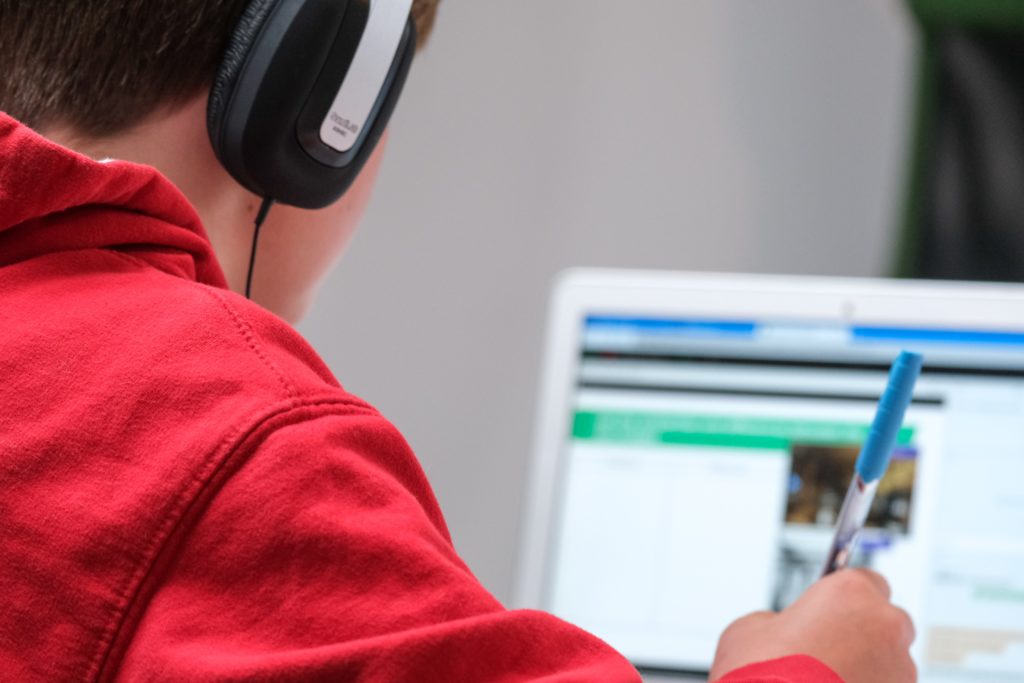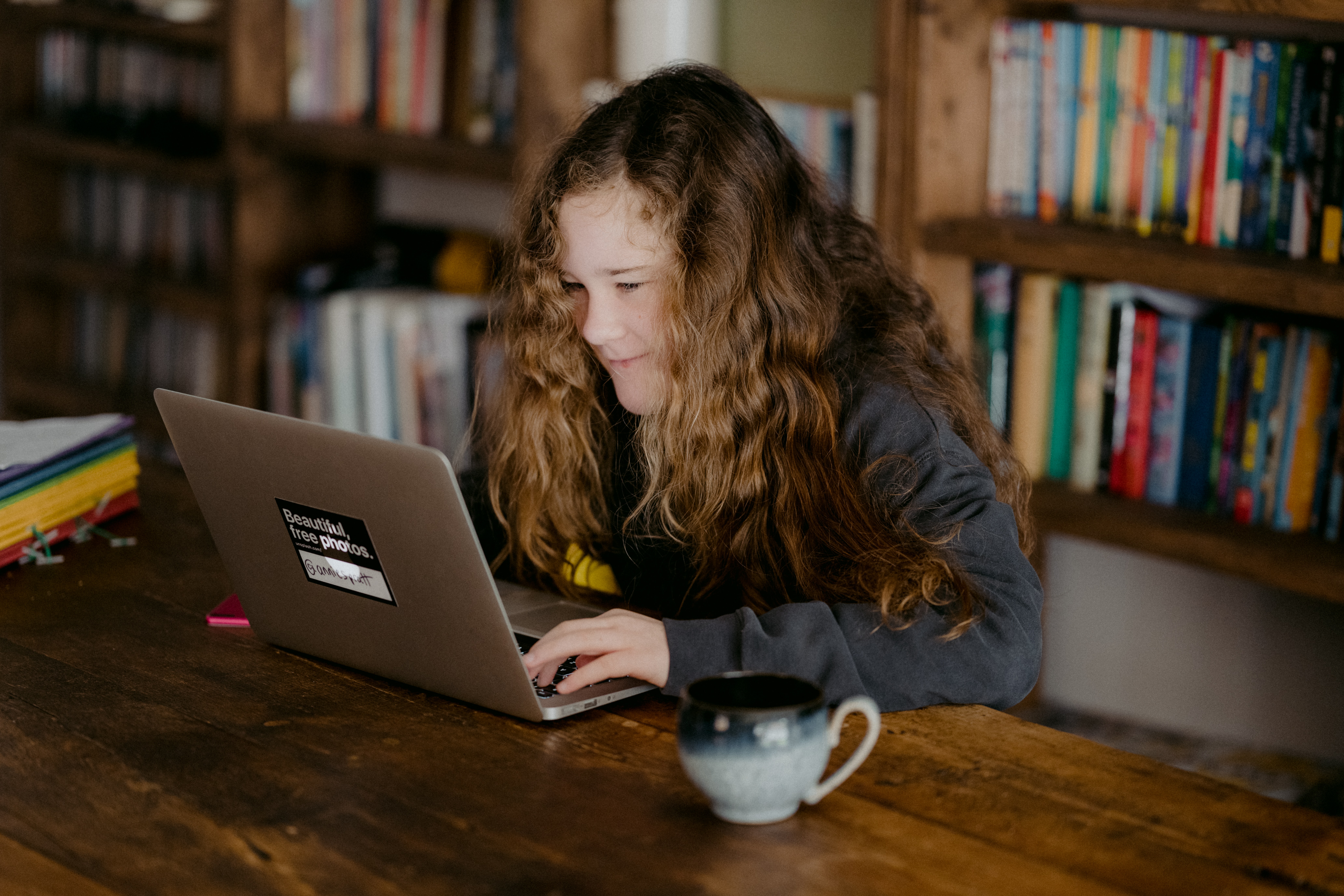Parent involvement can improve children’s academic and social development, especially in elementary school; and one of the key places for parents to support their children is at home. While communication with teachers also helps students engage at school, only parents can contribute to their child’s home context. Establishing great home routines for students can help provide them direction, keep them focused, and ultimately, help them succeed.

Photo by Annie Spratt on Unsplash
Minimizing Distractions at Home
The best way to minimize home distractions is to provide your student a dedicated workspace. Setting aside a space that they know is specifically for them to use for homework, and nothing else, builds an association with this space and productivity and work.
When deciding on a good space for them, please keep in mind three main considerations.
First, whether the area is quiet enough for them to be able to focus and concentrate on their work. Second, whether there is enough light for them to see all their work. Finally, whether your student has enough space and support in this workspace. For instance, considering if the area has enough desk space to spread out their books and homework, has a comfortable and supportive seat, and remains at a comfortable temperature (cool enough in the summer, and warm enough in the winter). This prevents any distractions that could be caused by their working environment. While of course this is not always possible, these are certainly the ideal conditions for studying.
Additionally, please keep useful materials such as pencils, pens, erasers, rulers, calculators, and extra lined and graph paper near or on this workspace for easy reach and use. This way, your student doesn’t need to interrupt their workflow to find the supplies they might need.
Establish a Homework Schedule Together
Determine how much time after school will be spent doing homework each day. For middle-school students, between 60 and 90 minutes is a typical average per night.
Work with your child to decide on a homework schedule, and do what you can to help facilitate that schedule. Often the best time to do homework is right after they get home from school. Directing them towards their workspace and providing them with a healthy snack and drink once you get home are simple nudges towards a more productive homework routine.
To keep them motivated, consider talking to your child about why we do homework. While you learn and practice concepts in class, grappling with these concepts independently is important, too. Practice—homework—helps build the pathways and connections in our heads to that material and makes the information easier to recall.
Handling Homework Problems

Photo by sofatutor on Unsplash
Some common homework problems include the following examples:
Problem: Your child doesn’t do their homework.
Solution: Determine if the material is too easy or too difficult for them. If it’s too easy for them and they don’t seem to do any homework once they get back from school, try providing them with extracurricular materials or activities. For instance, keep some age-appropriate books in different genres—both fiction and nonfiction—nearby their workspace. Math puzzles like sudoku and KenKens can be fun and challenging activities. If the material is too hard, reach out to their teacher and ask for their suggestions.
Problem: Your child often asks you for help with their homework.
Solution: Spend some time with your child to clarify the directions and see if that helps them proceed. However, should they still need extra help, you can turn to online resources that either you or your child can reference to help with the materials.
Problem: Your child has difficulty staying organized.
Solution: If they don’t already use one, consider introducing your student to a daily planner. Making a habit of writing down all their homework, activities, and extracurricular commitments in a planner means they only have one place to check to know what’s happening and when.
You can help them get into the habit of checking over their work by asking them to show you each assignment written in their planner. These days, Google Classroom or an online student portal may be the source of all their school information. In that case, also check over their online classroom or portal for homework. If your student uses Google Classroom, it’s good to check the “Missing” tab for any stray assignments.
For each of these particular problems, one of our fantastic tutors might also be able to step in and help you. If your child is finding their class curriculum difficult to understand, you might consider hiring a tutor to help implement teacher suggestions. In the case that your student resists you teaching them, you can also hire a multi-subject tutor who can help troubleshoot issues over several subjects. Should your child struggle to remain organized, one of our academic coaches can check in with them on a regular basis to remind them of their goals and assignments.
Browser Extensions and Apps to Help Keep Them Focused

Photo by Compare Fibre on Unsplash
These days, accessing schoolwork and resources almost always requires a computer or tablet. However, these electronic devices are also a source of endless distraction, especially on the Internet. We recommend the use of some of the following free browser extensions and apps to help keep your student focused on their work:
This open source browser extension lets you add a list of websites you’d like to be mindful of spending too much time on. Below that, you can add a list of things you’d rather be doing instead, such as “take five deep, calming breaths” or “pet my dog.” It doesn’t block the sites on your list; instead, it reminds you of your goals before putting you through to them. So as you’re opening up a Facebook tab, for instance, a calming nature photo appears asking you if you’re sure you want to go to Facebook—you said you’d rather take five deep, calming breaths?
The free Chrome extension StayFocusd blocks the websites of your choice for certain hours. Limits are customizable and can be fairly strict if you truly desire them to be; however, they named the “nuclear option” that way for a reason. A guide to using StayFocusd is here.
DayBoard is an interesting new browser extension that lets you input a list of the five most important things you need to do that day. So when you go to open Facebook, the list of things that you should do but haven’t yet greets you. This extension is currently in beta, and starts at a free basic plan.
Ultimately, It’s Up to Them
While you as their parent want to do everything you can to help them succeed, you can’t do their work for them. The responsibility for finishing their homework is ultimately up to them; the main thing you can do to help your student is provide them with a good workspace and your support. Hopefully, these suggested home routines for students can provide you and your child some inspiration for staying on track when studying at home.


